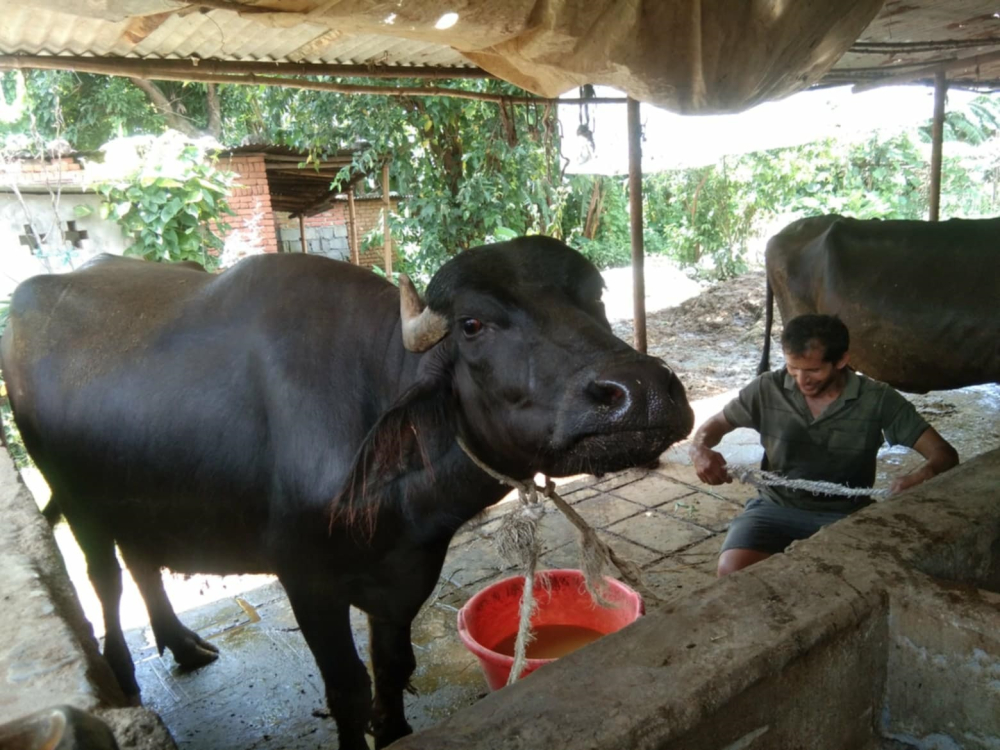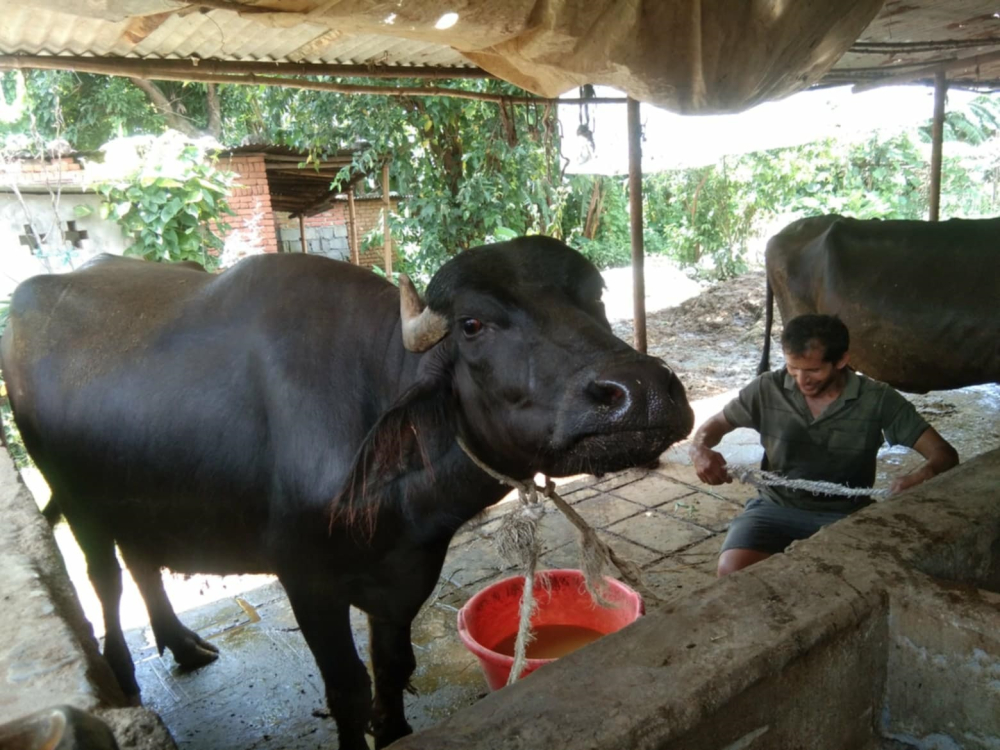Parashuram is not allowed to get sick

We use Google Cloud Translation Services. Google requires we provide the following disclaimer relating to use of this service:
This service may contain translations powered by Google. Google disclaims all warranties related to the translations, expressed or implied, including any warranties of accuracy, reliability, and any implied warranties of merchantability, fitness for a particular purpose, and noninfringement.




Waking up at half past three in the morning to take care of the cattle. Milk will be packed in about 100 plastic bags and delivered to homes. After all this work, after returning, you have to mow the grass. After 3 o'clock in the afternoon, the work of feeding the cattle starts again. Between 7 and 8 in the evening, the couple together deliver milk to the house again. In this way, it has been 17 years since he used to send 120 liters of milk to the market daily.

Calling the people of one and a half hundred houses by name, they put the pokas outside the door saying, 'Lau Dudh Ayo'. He is not only a farmer, but also active in social work. He also understands the political and economic fields equally. He also makes accurate comments about the country's politics in public events. When doing so much work, rain, clouds, summer and winter can't be said . Cooking must also be done.
50-year-old Parashuram Bhandari of Kushma Municipality-5 has been continuously active in 'Bhandari Agriculture and Poultry Firm' for 17 years. They say, 'I am not even allowed to get sick.' Instead, if someone gets sick, they go to work and support them. Malami and Janti are also afraid to go . ``If I fall ill, the customers don't get milk, they buy it from the market and eat it, but the buffaloes and cows have to be milked,'' said Bhandari, ``but I haven't gone anywhere for 17 years after spending the night.'' Along with his wife Kamala, they work day and night in the firm . His firm has 15 buffaloes and 15 duhuna cows .
For the last 25 years, he has been active in commercial agriculture. He spent almost 9 years cultivating vegetables. The experience of living in Germany gave him the ability to work like this. He did not see anyone sitting there. After completing his SLC in 2048, Bhandari went to Germany for employment while studying for certificate level in management faculty in 2049 . He said that he understood the importance of time while working in a hotel in German for three and a half years. Planning to return to Kathmandu in 2053 to operate a hotel . But fearing that he would become a stranger to the villagers, he returned home and took up the agricultural profession. Son Thomas and daughter Martina also helped in the household work . Now Thomas has reached America. Daughter is studying in Kathmandu.

Bhandari was having fun growing vegetables in the beginning . I didn't have to wake up at three o'clock in the morning. Nor was there work till 8 o'clock at night . Vegetables that have been well seasoned for one day would be enough even if you don't see them for two/four days. From 2053 to 2064 he cultivated vegetables . People used to line up to see snails, gourds and gourds grown in his garden. In front of the farmers who were growing vegetables only in plastic containers, he planted quintals of vegetables by planting quintals of bamboo and sold them. The market did not reach him. There was no way to send them to Pokhara, they could not sell vegetables in the Kushma market.
He was afraid of pesticides to be used in vegetables. "Vegetables have to be put in many kinds of pesticides, so I left that profession and started animal husbandry," Bhandari said, "I used to grow good vegetables from organic fertilizers, but I left the profession because I had to compete with pesticides." . Bhandari has the experience of not having to touch pesticides while rearing cattle .
Although he feeds some fodder, he feeds the cattle a lot of grass . He has cultivated grass in about 55 ropani more Pakho Kharwari . Nepayer, Molato and other advanced species of grass have been planted on their own and leased land . Two farmers have also kept . They cut the grass . During the afternoon, they also reach the kharbari and cut grass . Namlo brings it with him . He bought Malato, Paspalam and signal grass plants from the firm of Bamdev Gautam in Tanahun.
At the time of bringing the grass plants, the animal development office had sent a vehicle. Apart from that, in 16 years, he has not taken any government service facility . Instead, if one and a half lakh is received, they recommend to give it to small farmers . "I don't need two or three lakhs, if I give it to small farmers, they can become entrepreneurs," said Bhandari, "I need help to build quality labs." He suggested to do.
He commented that he found that the grains in the market were not of good quality and were mixed with stones. Veterinarian of Kushma Municipal Animal Development Branch. Rupak Kandel said that only pharmaceutical services and technical support were provided. "We don't want to get small or small assistance, we have only provided technical assistance," said Kandel, "we have to help in changing the roof of his barn, we have not been able to give it because there is no program." He said that Bhandari's hard work is commendable.
 Last year's lumpy skin disease became the deadliest for farmers. 3 duhuna cows also died in Bhandari's shed. It caused a loss of about 5 lakhs to him . Apart from that, the milk of each cow decreased by 50%. They could not send milk as per the demand in the market. Bhandari says that lack of milk supply is not only the farmers' fault, the state should take care. "We have helped the state, we should also collect taxes, but the state should think about how to feed milk to the consumers when the cost is high," he said He said that it should be done. Mayor Ramchandra Joshi said that many people were able to eat fresh milk in Kushma Bazar due to her hard work. Joshi says that when he reaches the farmer's house in the village, he gives the example of a steward. Bhandari's annual milk turnover of 36 lakhs is also very expensive. He said that after deducting cleaning and other expenses including grass, feed, medicines, the profit is only 10 to 12 lakhs per year.
Last year's lumpy skin disease became the deadliest for farmers. 3 duhuna cows also died in Bhandari's shed. It caused a loss of about 5 lakhs to him . Apart from that, the milk of each cow decreased by 50%. They could not send milk as per the demand in the market. Bhandari says that lack of milk supply is not only the farmers' fault, the state should take care. "We have helped the state, we should also collect taxes, but the state should think about how to feed milk to the consumers when the cost is high," he said He said that it should be done. Mayor Ramchandra Joshi said that many people were able to eat fresh milk in Kushma Bazar due to her hard work. Joshi says that when he reaches the farmer's house in the village, he gives the example of a steward. Bhandari's annual milk turnover of 36 lakhs is also very expensive. He said that after deducting cleaning and other expenses including grass, feed, medicines, the profit is only 10 to 12 lakhs per year.
 प्रकाशित : श्रावण १०, २०८१ ०७:३४
प्रकाशित : श्रावण १०, २०८१ ०७:३४

 २२.१२°C काठमाडौं
२२.१२°C काठमाडौं











